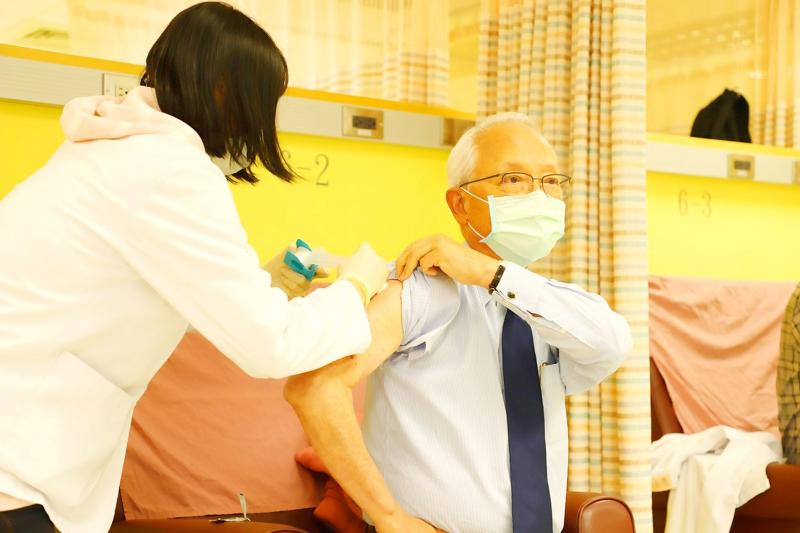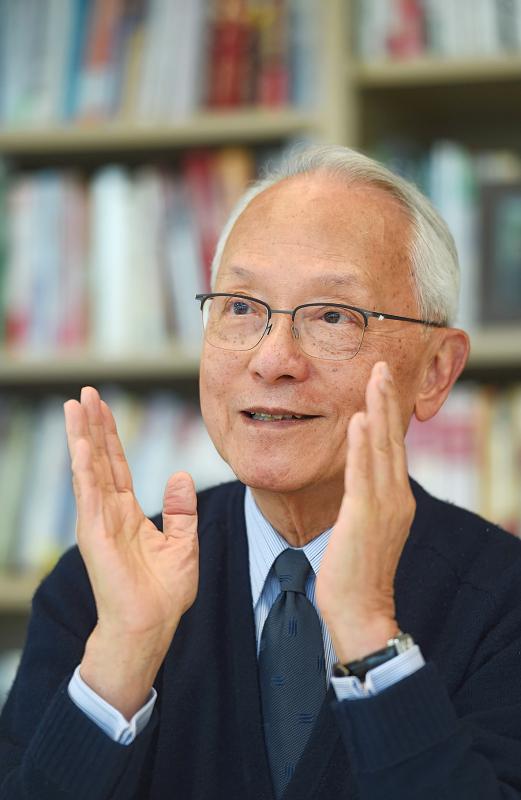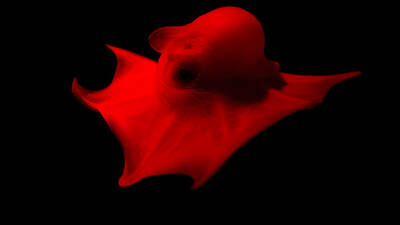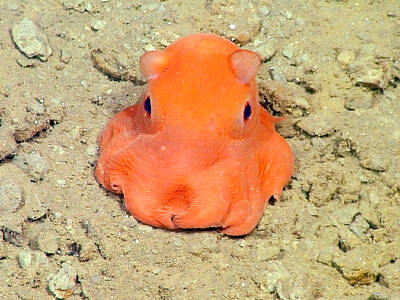The National Health Insurance (NHI) program’s global budget has been increasing year by year and is approaching NT$800 billion, forcing the NHI to increase its charges, so the Minister of Health and Welfare has promised to reform the system. However, Andrew Huang, superintendent of the Koo Foundation Sun Yat-Sen Cancer Center (KF-SYSCC), says that the first aspect of the NHI that needs to be changed is its reimbursement system. He says that the NHI should no longer “pay for quantity,” which makes hospitals compete for numbers of visits and patients, but should instead guide them to provide each patient with more complete care in a whole-person, holistic, full-course manner. Reimbursement should emphasize a result-oriented and value-oriented payment system using the minimum resources to achieve the optimal medical treatment outcome.
People often call KF-SYSCC an “aristocratic hospital,” but Huang says that 90 percent of KF-SYSCC’s patients are actually NHI patients, and most of them are not educated beyond senior-high school level. He says that the hospital provides financial support to the financially disadvantaged. The popular myth may stem from the fact that the majority of KF-SYSCC’s private clients are foreigners, and if Taiwan does not accept foreign insurance, they have to pay for their own treatment. However, medical treatment at the KF-SYSCC’s stem cell transplantation center and other departments costs only one-thirtieth of what it costs in the US, so KF-SYSCC makes hardly any money from foreign patients who cross the ocean to seek treatment.
“The real aristocrats are our patients.” In this one sentence, Huang describes KF-SYSCC’s model of medical treatment. While doctors at other hospitals have 100 or 200 patients registered to see them in one day, at KF-SYSCC, to ensure the quality of clinical visits, each doctor is limited to seeing about 20 patients in the course of one clinic. Furthermore, patient care at KF-SYSCC is carried out by teams that provide treatment across different departments. In principle, its doctors are paid fixed salaries, so they have no pressure to fulfill a quota and do not need to grab patients or push up the number of appointments. The important thing is to cure the patients. Furthermore, KF-SYSCC has Taiwan’s best standard nurse-to-bed ratios. This ensures that inpatients receive the best possible care, thanks to which the five-year survival rate of KF-SYSCC’s cancer patients has reached 74 percent — much higher than the 52 percent national average.

Photo courtesy of the Koo Foundation Sun Yat-Sen Cancer Center 照片:和信醫院提供
However, Huang also laments that because the NHI operates a global budget system, the NHI’s reimbursement point value can fluctuate. When other hospitals go for volume, it dilutes and reduces the point value, which causes an even greater monetary loss for KF-SYSCC with its restricted volume of visits.
Huang says that “pay-for-quantity” is an outdated system, and that if the NHI is to be reformed, it should move toward “pay-for-results.” This would turn it into a package service. For example, when treating breast cancer, by paying a certain amount according to the stage of the cancer, and paying an additional reward if the disease is successfully controlled for a number of years without recurrence. The important thing is to decide the payment according to the quality of the outcome and the value of the diagnosis and treatment — in other words, value-based payment. The NHI’s resources should not be used for ineffective treatment. The way to really economize on medical care resources is to cure diseases, and the most economical medical treatment is the treatment that works.
(Translated by Julian Clegg, Taipei Times)

Photo: Liu Hsin-de, Liberty Times 照片:記者劉信德
健保總額年年增加、已逼近新台幣八千億,因此被迫調漲費率,衛福部長也承諾將做改革。和信治癌中心醫院院長黃達夫則直言,健保第一個要改變的應是支付制度,不能再「論量計酬」,不應讓各醫院拼看診量、病人數,而應引導給予每一位病人全人、全方位、全程的更完整照護,給付應該要強調結果導向、價值導向的支付制度,要用最少資源達到最好的醫療效果。
外界常將和信形容為「貴族醫院」,但黃達夫強調,和信其實高達九成都是健保病人,而且以高中以下學歷為多,對於經濟弱勢者更會給予經濟扶助。外界迷思可能是因和信的私人客戶以外國人較多,外國保險如果台灣不接受就需自費,但和信幹細胞移植中心等醫療費用只是美國三十分之一,外國病人越洋求醫,和信也根本賺不了錢。
「病人才是貴族」,黃達夫一語道出和信的醫療模式,當別的醫院醫師一天排一兩百位病患掛號,和信為保看診品質,每位醫師一診限制只能看約二十個人,而且和信照顧病人是團隊,跨科別提供醫療,醫師原則上是領固定薪資,因此無業績壓力,不必搶病人、衝看診量,重要是把病人治好。而且,和信有台灣最佳標準的護病比,確保住院病人要獲得最好照顧。因此,和信的癌症病人五年存活率可達百分之七十四,遠高於全國平均的百分之五十二。
但黃達夫也感慨,健保是總額制,健保給付點值是會波動,當別的醫院在衝量,就把點值稀釋降低,限制看診量的和信就更虧錢。
黃達夫強調,「論量計酬」已是過時的制度,健保如要改革,應要走向「論結果計酬」,變成一個包裹式的服務,例如治療乳癌,根據癌症的期別付一定費用,如果幾年控制很好而不復發,再付獎勵金。重要是要看結果優劣、看診療的價值來決定給付,就是以價值為導向的支付。」健保資源不能用在無效醫療,把病醫好才能真正省醫療資源,惟有正確的醫療才是最經濟的醫療。
(自由時報黃以敬、蔡思培)

The deep waters off the coast of California are home to a bizarre creature: the flapjack octopus. This creature, known for its pancake-like appearance, spreads itself thin on the seabed as a clever survival strategy, making it difficult for predators to spot and capture it. With its unique, umbrella-shaped body formed by webbed arms, the flapjack octopus moves through the water in a graceful manner. It propels itself forward by rhythmically moving its body and contracting its webbed arms. Its pair of ear-like fins, which move independently yet with remarkable coordination, also help it explore the deep-sea environment. These

Bilingual Story is a fictionalized account. 雙語故事部分內容純屬虛構。 I stand by the Miluo River as dusk falls. The court betrayal is too much. I served Chu with loyalty. I forged alliances and fought corruption. But the whispers of jealous courtiers, the murmurs of treason, spoke louder. The king cast me out. The water looks calm. It promises peace. I step in. The river is cold against my legs. I hear shouts behind me — fishermen calling my name. I keep walking. The calls grow louder, but I do not turn around. The water rises to my chest. It pulls at me. I

In Taiwan, people can use a platform to rent a power washer for a weekend or share unused garage space for someone’s storage needs. These are examples of the sharing economy, a consumption model that has gained widespread adoption worldwide. This approach allows people to rent or share assets like cars, homes or even services, typically through online platforms. This innovative model poses a simple yet powerful question: why purchase infrequently used items when sharing is more practical? By making useful but idle resources accessible, the sharing economy turns them into sustainable opportunities. Internationally, platforms like Airbnb and Uber have popularized

Continued from yesterday(延續自昨日) https://www.taipeitimes.com/News/lang Many people may be familiar with flapjack octopuses thanks to Pearl, a charming character from the Pixar film Finding Nemo. However, her portrayal presents several scientific inaccuracies. In reality, flapjack octopuses are deep-sea creatures, which are unsuitable for the brightly lit shallow reef environment depicted in the film. Their primary defense mechanism relies on their reddish coloration, which would be ineffective in the well-lit shallows. Pearl’s famous line, “You guys made me ink,” is another fictional detail that is not consistent with the observed actions of real flapjack octopuses. As common as it is in many other octopus